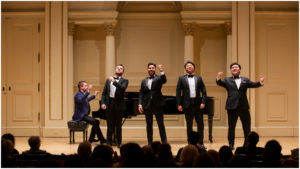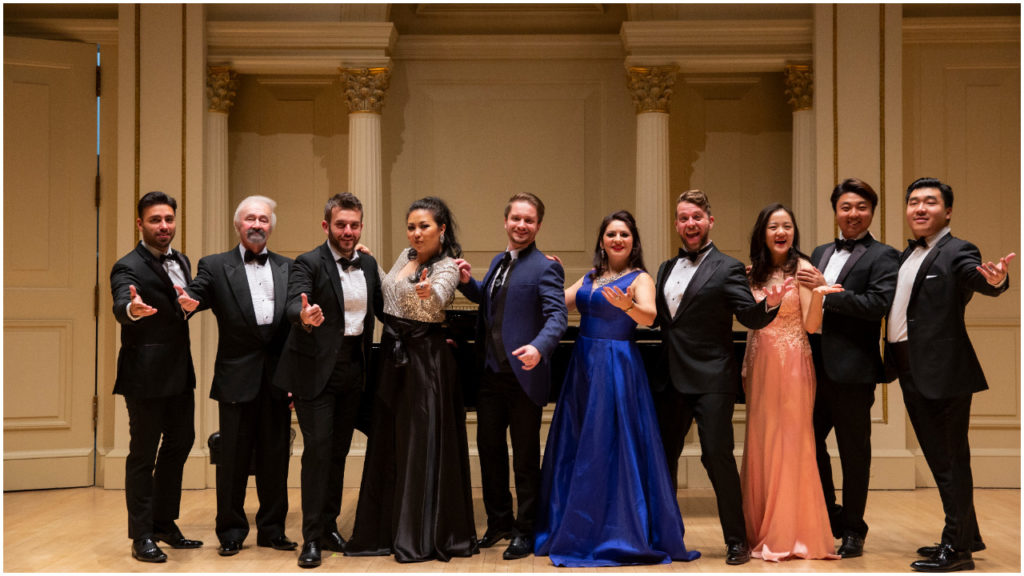
Talents of the World 2019 Review: All I Want for Christmas is Three Tenors
By Logan Martell(Photo Credit: Giorgi Gogidze)
On Dec. 19, 2019, Talents of the World returned to Carnegie Hall to kick off its second annual Christmas Festival with a spirited concert, titled “All I Want for Christmas is Three Tenors.” The evening’s program consisted of a selection of well-known operatic arias, holiday carols, art songs, and more.
Leading the roster of artists were tenors Giovanni Formisano, WooYoung Yoon, and John William Gomez; they were joined by a small handful from Talents of the World, such as company president and baritone David Gvinianidze, as well as winners of their recent International Voice Competition, making for a nice mix of new and familiar faces.
Opening the evening’s concert was the holiday classic “O Holy Night,” performed by the three tenors. Accompanied by Stanislav Serebriannikov, the artists came onstage one by one to cycle through the softly-rejoicing phrases with their unique vocal nuances. This song made for a lovely introduction to what the rest of the concert would have in store, as the tenors united for an electric, high C climax as the accompaniment settled to a powerful close.
After this, the first half of the program was devoted to operatic numbers from not only repertory favorites, but less well-known works as well. The next aria was “Amor Ti Vieta,” from Umberto Giordano’s “Fedora.” This brief piece was finely handled by Gomez, with a tender legato that gave credence to the words of certain love.
Carrying in this romantic vein was “Ah, leve-toi soleil,” from Gounod’s “Romeo et Juliette,” sung by Yoon. His affectionate rendition saw him establish and explore the musical and dramatic atmosphere with great expressivity. This quality was conveyed wonderfully as Yoon’s high note diminished before cresting to a splendid dynamic weight that closed the aria with a passionate sense of triumph.
Next was the aria “Tutto parea sorridere” from Verdi’s “Il Corsaro,” sung by Formisano, who was accompanied by Bradley Pennington. The delicate, dissonant chords of the introduction dropped off for Formisano’s opening phrases, before joining them with strong chordal underscoring. His sustained close of the first section drew applause before the piece went on to the cabaletta, where his forte repetitions carried a scornful quality that expressed Corrado’s bitter sentiments.
Making the best of a less-than-ideal situation, company director Olga Lisovskaya informed the audience of a last-minute addition of an artist to the roster: tenor Tianchi Zhang, who filled in to support John William Gomez due to the latter falling under the weather some time during his trip to the city. While Gomez proved well enough to sing for nearly all of his solo and joint numbers, Zhang’s presence added much to the evening. He sang “De’ miei bollenti spiriti,” from Verdi’s “La Traviata.” Following the quick, stately intro, Zhang plunged into the drama with a bracing, youthful passion that dyed much of his phrases as he rode to rising tempo to an ardent conclusion.
Making an appearance with the Habanera from Bizet’s “Carmen” was soprano Zoya Gramagin; her voice carried a sultry texture through her medium to lower range, at times rising with a bright sensuality. Supported by her confident bearing and the crisp chords from Serebriannikov, Gramagin delivered a solid rendition of this famous song.
Joining the evening’s artists were two winners who tied for fourth place in the company’s recent voice competition, baritone Jonathan McCullough and soprano Nina Mutalif. First up was McCullough, singing “Oh Vin, dissipe la tristesse,” from Thomas’ “Hamlet.” With much of the program focused on the higher voices, McCullough’s richer timbre stood out all the more, along with his resolute bearing. The dark vamp of Pennington’s accompaniment saw McCullough deliver brooding phrases on one side of the stage before dismissively walking away, looking back at the spot with a pained grin that finely conveyed his desire to leave those thoughts behind. McCullough displayed lower coloratura that saw reflection as the accompaniment flowed into a series of arpeggios, leading into a strong, bold conclusion.
A following number not long after saw McCullough joined by Mutalif for “La ci darem la mano” from Mozart’s “Don Giovanni.” Here, McCullough’s’s firmer tones carried less of the seductive aspect usually heard, drawing her in with a more tempting feel. Mutalif’s demurring could be heard from her voice as well as her expression, voicing Zerlina’s concerns with a lovely, conflicted nuance which colored her yielding repetitions of “non son piu forte.” Their vocal chemistry was highlighted all the more by their light, excited “andiam” repetitions as they exited, with McCullough closing the stage door behind them.
Mutalif’s opened the second half of the program, singing “O Paris gai sejour” from Lecocq’s operette “Les Cents Vierges.” The accompaniment opened with a rather-somber feeling before transitioning to a lively waltz, with Mutalif exuding a charming energy that built to a sustained vocal height which introduced the following section. Here she refined these feelings into a subtler, flirty style, with her quick “la” repetitions leaping with a gorgeous power. Her conclusion saw her deftly using rising colors to strongly settle into the aria’s close.
Taking things to musical theatre was Formisano, singing “Maria” from Bernstein’s “West Side Story.” His operatic start soon gave way to a fascinating mix of technique, able to flow between a more conversational quality to a huskier dramatic tone. Displaying both passionate high notes as well as delicate repetitions, his final sustained pianissimo briefly cut off before Formisano made a smooth recovery to close the number.
Singing “La Spagnola” by Vincenzo Di Chiara was David Gvinianidze and Olga Lisovskaya, with the latter joining the rhythm of the lively waltz with a relaxed flair, using soft trills to continue her phrases. Gvinianidze’s earthy timbre richly dyed his Spanish phrases, leading to a wonderful pianissimo which tapered to silence as before the two waltzed onstage between stanzas as the audience clapped along. Gvinianidze’s sustained tones were joined by Lisovskaya’s rising ones, with their respective strengths making for a strong conclusion,
The evening featured a number of powerful songs and arias shared between the four tenors, such as “La Donna e Mobile,” from Verdi’s “Rigoletto,” “Nessun Dorma,” from Puccini’s “Turandot,” and “Granada” by Agustin Lara. These numbers followed a general structure where Formisano’s solid opening phrases were continued by Gomez, with Yoon handling instances of climactic or ornamented phrases. Their powerful, united high ‘C’s consistently drew great applause from the audience.
Bringing the program to a close were a selection of Christmas songs. First of these was “White Christmas” by Irving Berlin, sung by Gomez. His lower texture and smoother consonants retained a warm sentiment, with Serebriannikov’s accompaniment featuring lush, jazzy chords and trills as Gomez diminished and rose back up wonderfully. Next was Zhang singing “Silent Night” in Mandarin Chinese, making for an interesting variation as he handled the phrases with great affection. Next was the traditional carol “The First Noel,” sung by Yoon, whose relishing vocality was matched by the wonderfully expressive accompaniment, with both working towards a soft, faithful close. Last of the Christmas songs was “Let it Snow,” with the four tenors being joined by the rest of the evening’s artists. The fun rhythm of the accompaniment saw the men and women trading phrases with great energy, building to a massive, tutti conclusion.
With the first half of their Christmas Festival strongly tucked under their belt, Talents of the World will no doubt thrill on Sunday’s Christmas Ball.



